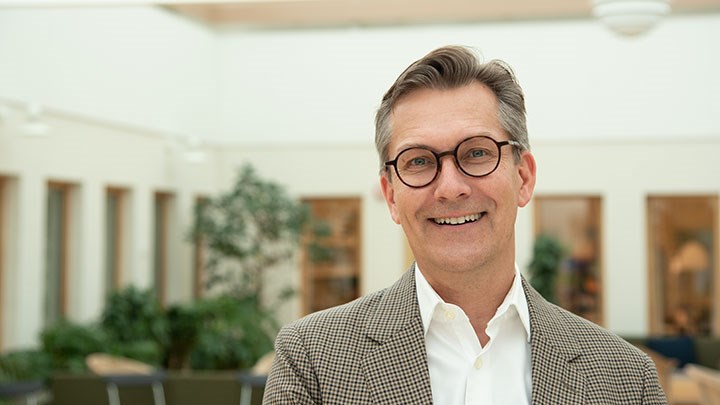Thomas Strandberg - new professor 2023

Thomas Strandberg is professor of social work. His research currently includes studying the situation for children to parents with cognitive impairment.
“Parents with these challenges are a vulnerable group who are often in need of support in their parenting. In Sweden, we have as a result adopted a national strategy to enable access to this kind of support to all parents,” he says.
- 1965 Born in Sundsvall, Sweden
- 2006 Obtained his PhD in disability science at Örebro University with his thesis Vuxna med förvärvad traumatisk hjärnskada – omställningsprocesser och konsekvenser i vardagslivet (Adults with acquired traumatic brain injury – the changeover process and consequences in everyday life)
- 2017 Docent in Social Work at Örebro University
- 2020 Professor of Social Work at Dalarna University
- 2022 Professor of Social Work at Örebro University
Thomas Strandberg began his academic career in 2001 as a doctoral student in disability science at Örebro University, the same subject area that today is called “disability research”. Prior to that, he was working within social care for persons with intellectual disabilities, among other things within management. After training as a vocational teacher in the field, he was teaching pupils aged 16-19 until he embarked on his doctoral studies.
Ever since being an undergraduate student, matters relating to care for persons with disabilities has interested him. His research interests also include matters relating to ageing, which led him to get involved in Örebro University’s initiative for ageing research, among other things as a doctoral supervisor.
“The ageing research initiative at Örebro University has been extensive and I hope the research will continue in an interdisciplinary research environment, even when the graduate schools wrap up,” he says.
Fortunate move to Örebro
Thomas Strandberg also has international experience. The most significant is from Riga in Latvia where he was working at a boarding school for socially vulnerable children and teenagers growing up without parents, at the same time as he was writing his Master’s thesis at the Higher School of Management and Social Work, Attistiba, in Latvia.
His next stop turned out to be Örebro.
“It felt like I made the right choice and that it was a good decision to move to Örebro. I still live here, despite a couple of detours to Mälardalen University and as professor of social work at Dalarna University.”
Thomas Strandberg has mainly studied how adults with various disabilities manage their life situation. He has looked at how acquired traumatic brain injury or visual field loss affect people’s activity and participation in everyday life, working life and in society in general.
Research on parenting support
Lately, his research interests have widened to also include children with disabilities – and children of parents with disabilities. He is currently leading a research project on the significance of a parental support programme for parents with intellectual disabilities or cognitive impairment, who have children aged 0–9 and who need support from social services in their parenting.
“This really is an important study because these parents are a vulnerable group that often need support in their parenting. Having methods in place that we know work is therefore vital.”
Parenting support aims at reducing the risk of neglect and at developing skills and abilities in these parents.
Thomas Strandberg cooperates with other researchers nationally and internationally. In 2017, he was the coordinator of an international conference on disability research.
His most important international contact was established when he was in Sydney during his doctoral studies. Ever since he has been collaborating with Professor Grahame Simpson, research leader within brain injury rehabilitation.
Thomas Strandberg has also held academic leadership positions at Örebro University – as director of division, head of school, head of subject and now deputy dean at the Faculty of Humanities and Social Sciences.
“I have to confess that I do enjoy administrative assignments of different kinds where my leadership skills are challenged in an exciting academic setting.”
